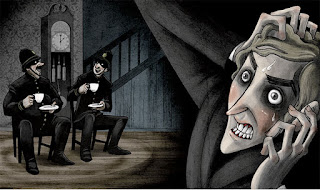The Heart That Talked Too Much
What’s
stopping you from committing the perfect murder? The idea of murder is not for
the sane, the meticulous planning before and after the act is not for the
complacent, and the disposal of the corpse is not meant for the weak hearted. But
what happens if you do all these three perfectly, yet give yourself up to the cuffs at
the home stretch? There we have The Tell-Tale Heart, Poe’s ever sinister
short story.
A man convinced
that he is not mad takes us through his journey of the act of murder of an old
man and its aftermath. The motive is simple, he just cannot bear the sight of
his pale blue eye with the film on it. He proudly explains the patient and dedicated
planning with scrupulous attention to detail. The joy of the murder and the
ease of his cause of pain explained by the murderer makes the reader truly
question his sanity which he was desperately trying to prove in his first
entrance.
Now what
went wrong? Even with a relatively quiet death, and a clean disposal of a dismembered
corpse under the floorboards, the deed was far yet from complete. The three
cops who were called in for a disturbance was the last hurdle. Clean rooms, no evidence
of murder and a composed mind of the murderer is enough to get through this. Right?
Perhaps he was too composed, but the heart of the corpse was beating louder and
louder, so loud that he couldn’t bear it. Eventually, pulling the floorboards,
he shrieked, "dissemble no more! I admit the deed!"
Reading the
story, it reminded me almost immediately of the interrogation scene from the
film, American Psycho (2000). Here Detective Donald Kimball conducts an
unofficial investigation on Patrick Bateman for the murder of Paul Allen, which
he was guilty of. The director has brilliantly filmed three versions of the same
scene, one where the detective is unsuspicious of him, one where he is slightly
suspicious and the third one where he is convinced that Patrick is the murderer.
It is stitched together so that the audience is always guessing about the
extend to which the detective knows the truth. A similar anxiety can be seen here.
Perhaps
one could never use rationality to justify what happened here. Was the same madness
that made him commit the act lead to this mishap? What was so repulsive about an
eye that could lead to murder? And how could a heart beat ever so loud, unless
it were just the imagination of the murderer?
Macbeth would
have felt a similar fear as he saw the ghost of Banquo after ordering his death. It led to himself almost giving away his guilt to his courtiers. Was it subconscious guilt personified? Why do we even have one?
Reading the story is an amazing experience even
today and I could only imagine the shock of the audience back then, in an era
where violence and gore wasn’t something they would view with popcorn and ice
cream. If you’re lazy to read, just watch Hitchcock films. Its almost a
screenplay adaptation of Poe’s works.
Let me know if you’d like a review on any Hitchcock
films. Murder is on the table!
Until next time…
Lan




Comments
Post a Comment